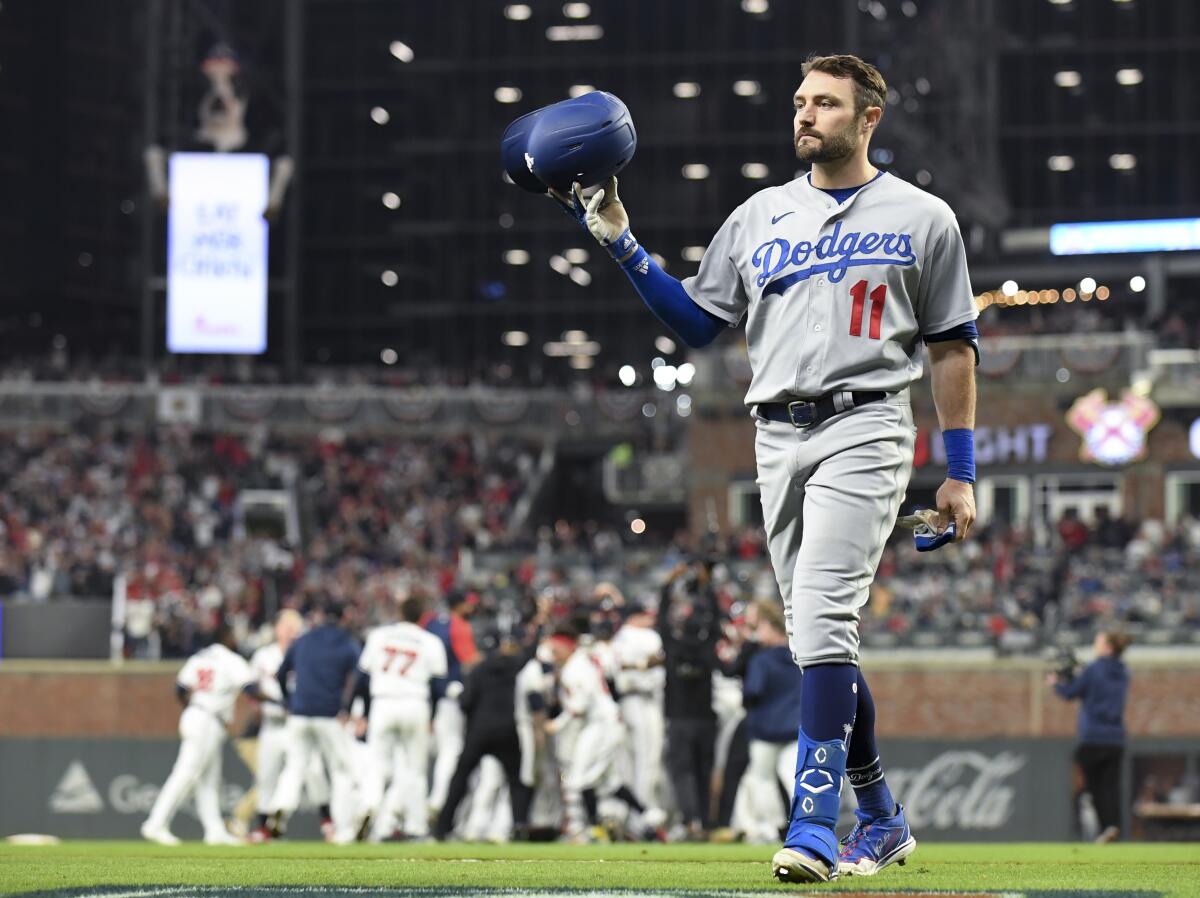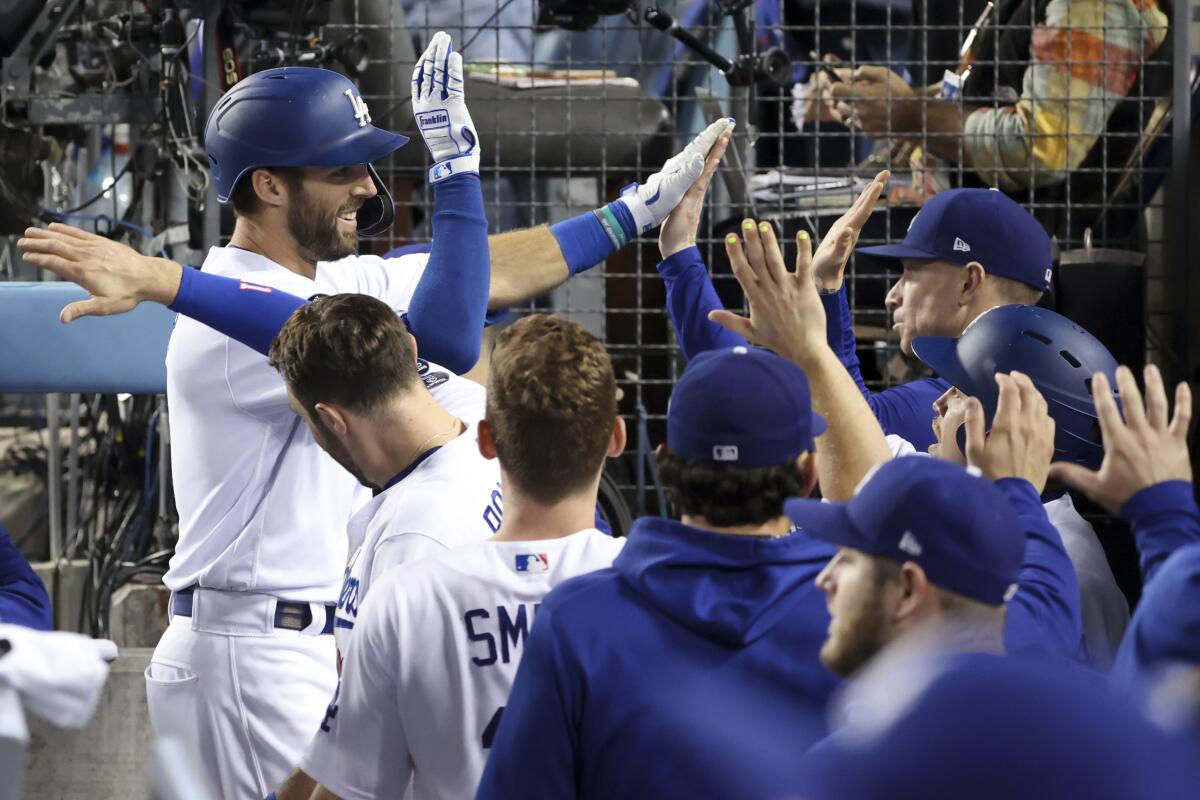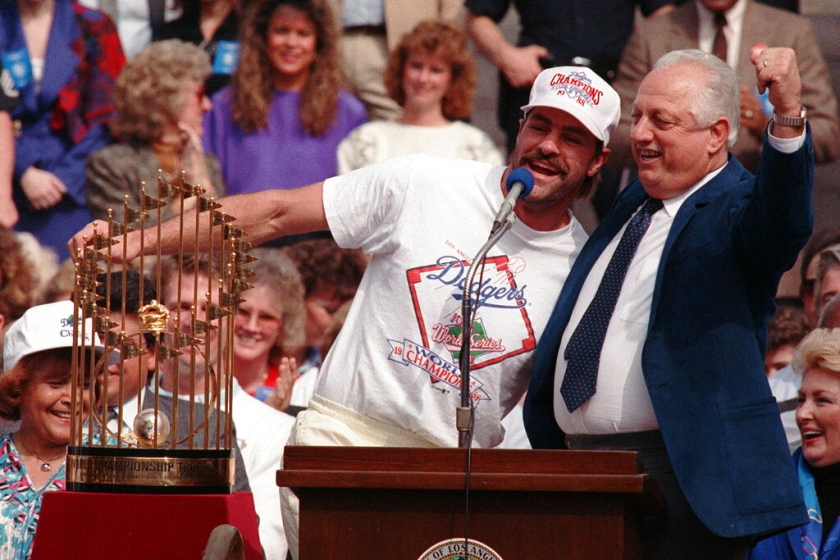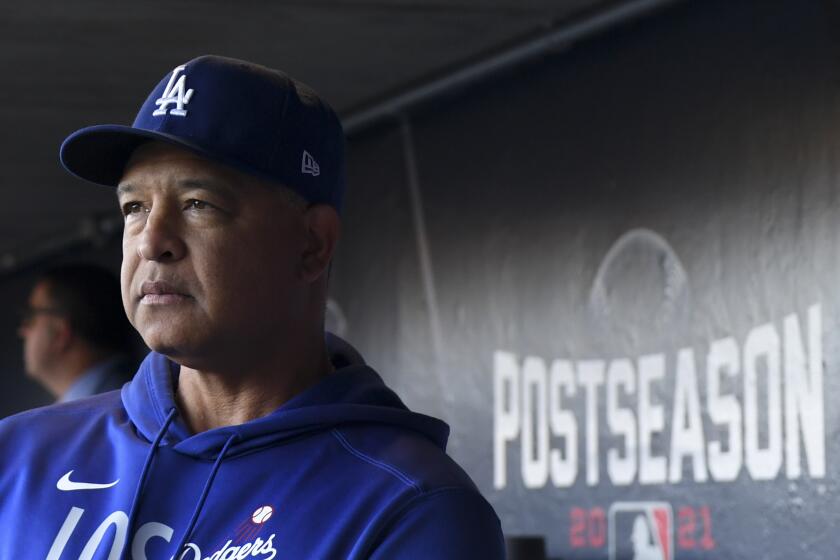The grind to repeat as champions proved to be too much for Dodgers

The clock had just struck midnight on Saturday and the Dodgers’ season, and rage didn’t fill Mookie Betts. The Atlanta Braves toppled the Dodgers in Game 6 of the National League Championship Series to cease the club’s pursuit of back-to-back World Series titles but Betts was not angry. The superstar outfielder was not crushed. At least he didn’t portray himself that way.
“I am not disappointed at all. It is what it is,” Betts said in the hallway outside the visiting clubhouse at Truist Park. “You win some, you lose some. We didn’t score more runs than they did. They played well.”
Betts’ sentiment was echoed by manager Dave Roberts and other players who spoke to the media after the 4-2 loss. A few veterans addressed the clubhouse before they packed up and exited the ballpark. But if there was an outpouring of emotion, it was hidden from the public eye.
“I don’t think losing in the NLCS is as big a letdown as everyone is going to make it out to be,” starting pitcher Walker Buehler said. “We won 106 games. We won a couple of playoff series. This was a special team in a lot of ways, and it just so happened that we are not going to win the World Series this year. That’s part of this game.”
The collective reaction to the season ending without a National League pennant depicted the recognition of a truth they declined to directly admit in front of cameras and voice recorders. The Dodgers were drained. They were battered. They were incomplete.
“We kept grinding,” closer Kenley Jansen said. “Everything we asked everyone to do, everyone did their job. And we came up short. It was a great group of guys we had here. And it was a great ride.”
That isn’t to suggest the Braves didn’t encounter roadblocks. All-Star pitcher Mike Soroka’s year ended before it began. They lost perennial MVP candidate Ronald Acuña Jr. for the season in July. They lost Marcell Ozuna for the season when he was arrested for domestic violence in May. Jorge Soler, one of four outfielders acquired as part of Atlanta’s outfield reconstruction, missed most of the NLCS after testing positive for COVID-19. Every team deals with unlucky breaks.
The Dodgers have more money than most franchises to patch holes on the fly. And they tried. But an uncharacteristic lack of organizational depth combined with bad injury timing, a relentless schedule, and faulty pitching plans left them limping to the finish line in their attempt to become the first club to win consecutive championships since the New York Yankees claimed three straight from 1998 to 2000.
The Dodgers never got the chance to properly celebrate their 2020 World Series championship. And now their 2021 season is over short of another title.
“It’s just tough,” Betts said. “It’s tough to win just in general, but going back-to-back, it’s exponentially harder, especially with the injuries and everything that teams go through. There’s a reason why it’s been so long since it’s been a back-to-back [champion]. It’s just really hard to do.”
The Dodgers had two major needs at the trade deadline: starting pitching and bench depth. Both are traditionally strengths for rosters Andrew Friedman constructs. This year, even with a $260-million payroll, was different.
This year, Dustin May underwent Tommy John surgery in May. This year, the risky decision to sign Trevor Bauer detonated on the front office when he was accused of sexual assault and placed on paid administrative leave. This year, Clayton Kershaw dealt with a significant forearm injury for the first time in his career.
To bolster the starting pitching, Friedman acquired three-time Cy Young Award winner Max Scherzer from the Washington Nationals at the July 30 deadline. They took All-Star Trea Turner with him. It cost them four minor leaguers, including top prospects Keibert Ruiz and Josiah Gray, in addition to agreeing to take on the remaining money on Scherzer’s contract.
The Dodgers also signed Cole Hamels and traded for Danny Duffy for rotation insurance. Adding Turner bolstered the roster’s position player depth. Once Kershaw returned from the injured list in September, the Dodgers appeared set for the postseason with four quality starting pitchers. The trade, for a stretch, was being discussed as the most important deadline deal in Major League Baseball history.
But the blueprint began disintegrating before the postseason. Hamels was given $1 million to play catch and try a simulated game, in which he hurt his arm. Duffy never recovered from an elbow injury. Then Kershaw aggravated his forearm injury Oct. 1 and didn’t pitch again.
Two days later, Max Muncy suffered a gruesome left elbow injury in the regular-season finale minutes before the Dodgers’ streak of National League West titles ended at eight when the Giants won in San Francisco. The Dodgers kept saying they hoped Muncy could return in the playoffs, but that was never realistic.

So, in 72 hours, the Dodgers were left without two of their most important players for the postseason. It was too late for external help. They had what they had. Adding to the misfortune, finishing in second place meant they had to play in the wild-card game.
Muncy’s absence created a crater in the middle of the lineup in the postseason. The Dodgers’ offense struggled without him. They scored four or fewer runs in eight of their 12 playoff games. Maybe Muncy would’ve made a difference. Maybe maddening inconsistency would’ve doomed them anyway.
And instead of carefully deploying the three pitchers they trusted to start games, the Dodgers decided to add stress to their arms. Buehler was needed to start on short rest for the first time in his career in Game 4 of the National League Division Series. Two days later, Roberts inserted Scherzer to close out Game 5 three days after he logged seven innings in Game 3.
The choices hurt them in NLCS when it immediately became clear that the stress of chasing down the Giants in September combined with playing the wild-card game and surviving their rivals in a thrilling five-game division series left them drained.
They opted for a bullpen game in Game 1 and lost. The next night, Scherzer didn’t complete five innings in Game 2 because he was dealing with a “dead arm.” Later that night, Julio Urías was used in relief in the eighth inning. He fumbled away a two-run lead.
In Game 3, Buehler logged 3 2/3 innings. In Game 4, Urías gave up five runs in five innings. Justin Turner later limped off the field with a season-ending hamstring injury as the Dodgers fell behind 3-1 to the Braves in the NLCS for the second year in a row. The next afternoon, before Game 5, Betts acknowledged the vibe wasn’t the same as the year before.
Dave Roberts has another year left on his contract, but the Dodgers manager is hoping and expecting to work out an extension with the team.
“Well, we got a couple injuries,” Betts said. “I think that’s the main thing … being down a starter. Obviously, going into this series we had to throw Scherzer [in Game 5 of the NLDS] and whatnot, so we were kind of behind the eight-ball at the start. But that’s not an excuse.”
The Dodgers won that night at Dodger Stadium with an 11-run explosion behind Chris Taylor’s three home runs. They were supposed to have a pitching advantage for the next two games in Atlanta. But Scherzer’s arm didn’t recover in time to start Game 6, forcing the Dodgers to give Buehler the ball on short rest for the second time in 12 days. He pitched four innings and served up the go-ahead three-run home run to NLCS MVP Eddie Rosario.
“It’s the playoffs, man” Buehler said. “That is what it takes to win in the playoffs. Sixty-game season, it’s a different animal. This is the real playoffs, and we didn’t get it done. We’ve been there before, and bounced back, and won games. That’s what we’re going to continue to do.”
Buehler is probably right. The Dodgers will likely report to spring training as World Series contenders again. But they could look very different. Kershaw, Jansen, Scherzer, Taylor, and Corey Seager are all free agents. A fascinating offseason is ahead. A long season is behind them.
More to Read
Are you a true-blue fan?
Get our Dodgers Dugout newsletter for insights, news and much more.
You may occasionally receive promotional content from the Los Angeles Times.













